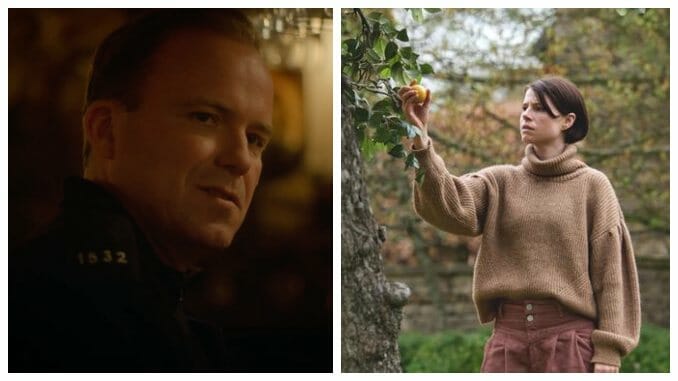Jessie Buckley and Rory Kinnear Interview: Confronting Their Inner Demons in Men

Whenever writer/director Alex Garland points his pen, or lens, at a subject, the only certainty is that by the end of the journey, he’s going to expose the audience to things they’ve never seen before. Usually, he likes to use science fiction (Annihilation) and technology (Devs) to dig into our human frailties and flaws. But in his latest, Men, Garland’s taking a sojourn into folk-horror territory to look at grief, guilt and toxic masculinity.
A contemporary tale set in England, Men sees Jessie Buckley play Harper, a self-sufficient career woman who has been recently widowed. The circumstances of her husband James’ (Paapa Essiedu) death factors deeply into the story and prompts her to travel from London to the Cotswolds for an isolated two-week retreat in a rented manor. Attempting to work through her complicated feelings in some solitude, she’s instead constantly made to interact with the men of the small village, all of whom are played by Rory Kinnear.
A series of fascinating interactions document with startling accuracy the everyday microaggressions women navigate from the opposite sex, which start as just nosey and slightly invasive and escalate to terrifying and violent. And then in the third act, Garland’s promise to floor your eyeballs is realized in one of the most surreal sequences he’s ever captured on film. Audiences will have a field day parsing the symbolism and subtext out of one of the strangest body horror moments in recent memory. And that got us at Paste wondering what Buckley and Kinnear thought about Garland’s script and then seeing it all come together on-screen. We got on a Zoom interview with Jessie Buckley and Rory Kinnear to get their thoughts on Men.
-

-

-

-

-

-

-

-

-

-

-

-

-

-

-

-

-

-

-

-

-

-

-

-

-

-

-

-

-

-

-

-

-

-

-

-

-

-

-

-








































